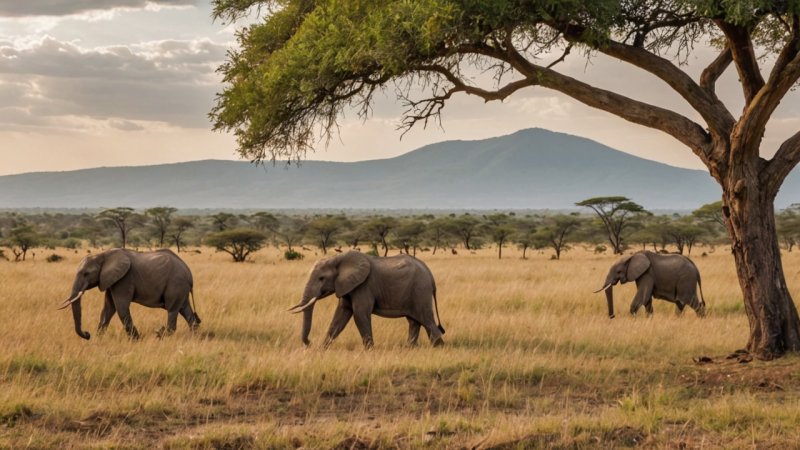Wildlife safaris are a thrilling way to experience the beauty and diversity of nature while observing animals in their natural habitats. These adventures offer unique opportunities to connect with wildlife and appreciate ecosystems often far removed from urban life. However, with the excitement of seeing majestic creatures comes the responsibility of ensuring that these experiences do not harm the animals or their environments. Responsible adventure travel is not just a trend; it is essential for sustainability and conservation. This article explores best practices for enjoying wildlife safaris responsibly, ensuring that travelers can appreciate the wonders of nature while contributing to the preservation of the ecosystems they visit.
Understanding Wildlife Conservation
Before embarking on a wildlife safari, it’s important to understand the principles of wildlife conservation. The primary goal of conservation is to protect species and their habitats, ensuring that future generations can enjoy them. Many safari operators work closely with conservation organizations and local communities to promote sustainable practices. Learning about these initiatives can enhance your experience and help you appreciate the broader context of your adventure.
Choose Responsible Tour Operators
One of the most critical steps in planning a wildlife safari is selecting a tour operator that prioritizes ethical practices. Look for operators that are certified by reputable conservation organizations or those that have a proven track record of responsible tourism. These companies often support local communities, promote wildlife conservation, and adhere to strict guidelines on animal interactions. Reading reviews and seeking recommendations can also help ensure you choose an operator that aligns with your values.
Questions to Ask Your Tour Operator
- What are your policies regarding wildlife interactions?
- How do you support local communities?
- What conservation initiatives are you involved in?
- Can you provide information on your environmental practices?
Respect Wildlife and Their Habitats
When on safari, it is essential to remember that you are a guest in the animals' home. Maintaining a respectful distance from wildlife is crucial for their safety and well-being. Many countries have laws governing the minimum distance that should be maintained from animals to avoid causing them stress. Additionally, always follow the guidelines provided by your guide to minimize your impact on the habitat.
Key Practices to Follow
- Keep Noise to a Minimum: Loud sounds can startle wildlife, potentially causing them to flee or behave unpredictably.
- Do Not Feed Animals: Feeding wildlife can disrupt their natural foraging behaviors and lead to dependency on human food.
- Stay on Designated Paths: Straying from marked trails can damage vegetation and disturb animal habitats.
- Never Approach Animals: Close encounters can be dangerous for both you and the animals.
Support Local Communities
Responsible adventure travel includes supporting the local communities that live alongside wildlife. Many safari operators partner with local people to provide authentic cultural experiences. Engaging with these communities not only enriches your journey but also helps ensure that local residents benefit from tourism. This can lead to better conservation outcomes, as communities see the value of preserving wildlife and their habitats.
Ways to Support Local Communities
- Participate in cultural activities, such as traditional dances, crafts, or cooking classes.
- Buy handmade crafts or souvenirs from local artisans.
- Stay in locally-owned accommodations.
- Contribute to community-based conservation projects.
Leave No Trace
One of the hallmarks of responsible travel is the principle of leaving no trace. This means that your visit should leave as little impact on the environment as possible. Simple practices can go a long way in preserving the natural beauty of safari destinations.
Leave No Trace Principles
- Plan Ahead: Research and prepare for your trip to minimize your impact.
- Travel with Reusable Items: Bring reusable water bottles, bags, and utensils to reduce waste.
- Dispose of Waste Properly: Always dispose of trash in designated bins or take it with you.
- Respect Wildlife: Observe animals from a distance and do not disturb their natural behaviors.
Educate Yourself and Others
Finally, one of the most powerful ways to practice responsible adventure travel is through education. Understand the species you are observing, their behaviors, and the challenges they face. Share this knowledge with fellow travelers and your social networks to raise awareness about wildlife conservation. Engaging in discussions about responsible travel can inspire others to make informed choices and adopt sustainable practices in their adventures.
Resources for Further Learning
- Books on wildlife conservation and photography
- Documentaries about wildlife and ecosystems
- Websites of reputable conservation organizations
- Local guides who can share their knowledge and experiences
In summary, wildlife safaris offer incredible opportunities to connect with nature and observe animals in their habitats. However, with this privilege comes the responsibility to ensure that our travel practices support conservation efforts and respect the environments we visit. By choosing responsible tour operators, respecting wildlife, supporting local communities, leaving no trace, and educating ourselves and others, we can enjoy the thrill of adventure while contributing positively to the preservation of our planet’s natural treasures. Responsible adventure travel is not just a choice; it is an essential part of ensuring that future generations can also experience the awe of wildlife in their natural habitats.






